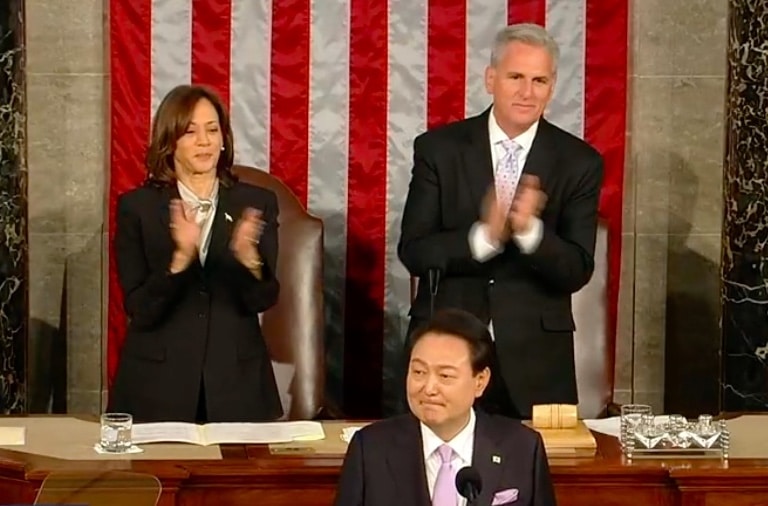A joint effort to “safeguard freedom and democracy throughout the world” was the underlying theme of South Korean President Yoon Suk Yeol’s address before Congress on Thursday.
He started off by thanking the bipartisan, bicameral session of Congress for marking the 70th anniversary of the alliance between the U.S. and the Republic of Korea—the reason for the timing of his visit—adding, “No matter where you sit, you stand with Korea,” receiving one of the first of many standing ovations he received from both sides of the aisle during his roughly 45-minute speech.
Referencing the “sacrifice” made by tens of thousands of Americans during the Korean War, he noted that the alliance formed in its aftermath between the U.S. and South Korea is “stronger than ever, more prosperous together, and more connected like no other. Indeed, it has been the lynchpin safeguarding our freedom, peace and prosperity.”
But today, Yoon asserted, “democracy is at risk” from threats of authoritarianism borne of propaganda and disinformation.
With this, he moved to the threat from North Korea and its nuclear program.
“We need to speed up U.S., Korea, Japan trilateral security power operations to counter the increasing North Korean nuclear threat,” he said, adding that Seoul would keep open the door for dialogue with Pyongyang and encourage any efforts by the North to end its provocations and “take the right path.”
Yoon further noted that freedom and democracy were also under threat in Ukraine.
“The war against Ukraine is a violation of International law,” he stated. “It is an attempt to unilaterally change the status quo with force.”
He declared that South Korea “strongly condemns the unprovoked armed attack against Ukraine,” comparing it to North Korea’s invasion of the South in 1950.
“Democracies came running to help us, and we fought together and kept our freedom,” he said. “Korea’s experience shows us how important it is for democracies to uphold solidarity. Korea will stand in solidarity with the free world. We will actively work to safeguard the freedom of the people of Ukraine and support their efforts in reconstruction.”
Yoon also noted that after the Korean war, South Korea was was one of the least developed countries in the world, with an annual income of “just 67 U.S. dollars of capital.” But now, after U.S. economic development programs in South Korea, Yoon said its economy ranks 10th in the world.
With this, South Korea is contributing to the U.S. economy through mutual investment in technology, including in the development of electric vehicle batteries and semiconductors, the manufacturing of which have led to “decent, well-paying jobs” in the U.S.
“I hope to see more economic cooperation,” he added, and went on to refer to artificial intelligence and quantum technology. “Together we will create a great synergy.”
He concluded by stating that the U.S.-South Korean alliance was one of universal values—those of freedom, human rights and democracy, which he called the “very foundations of our bonds.”
“Together our alliance will continue to move towards the future,” he said. “We will build a world of tomorrow that opens endless opportunities for our future generations. I look forward to everyone being on board for our new journey together.”


